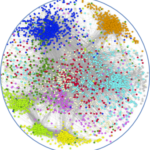Link to Pubmed [PMID] – 24550197
Link to DOI – 10.1093/biostatistics/kxu001
Biostatistics 2014 Jul; 15(3): 569-83
Regularized generalized canonical correlation analysis (RGCCA) is a generalization of regularized canonical correlation analysis to 3 or more sets of variables. RGCCA is a component-based approach which aims to study the relationships between several sets of variables. The quality and interpretability of the RGCCA components are likely to be affected by the usefulness and relevance of the variables in each block. Therefore, it is an important issue to identify within each block which subsets of significant variables are active in the relationships between blocks. In this paper, RGCCA is extended to address the issue of variable selection. Specifically, sparse generalized canonical correlation analysis (SGCCA) is proposed to combine RGCCA with an [Formula: see text]-penalty in a unified framework. Within this framework, blocks are not necessarily fully connected, which makes SGCCA a flexible method for analyzing a wide variety of practical problems. Finally, the versatility and usefulness of SGCCA are illustrated on a simulated dataset and on a 3-block dataset which combine gene expression, comparative genomic hybridization, and a qualitative phenotype measured on a set of 53 children with glioma. SGCCA is available on CRAN as part of the RGCCA package.


